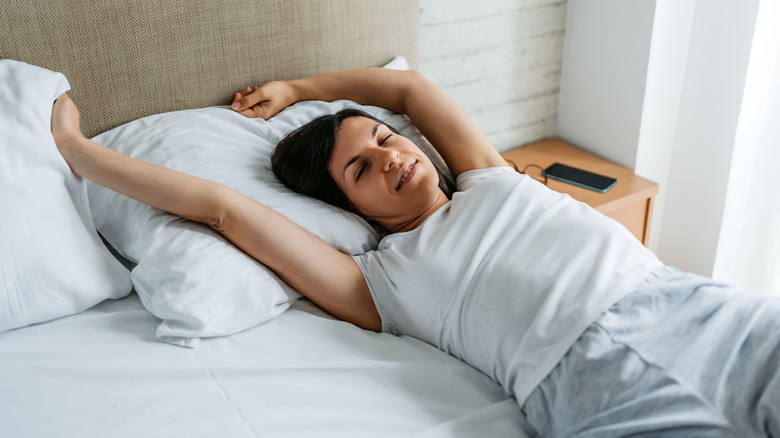When You Sleep In, This Is What Happens To Your Blood Pressure
Running yourself ragged during the week can have you cutting short on sleep. You long for the weekends when you can ignore your alarm and enjoy a few extra hours of pillow time. You're not alone. According to Sleep Doctor, 56% of people sleep in on the weekends to pay off their sleep debt. Sleeping in can break you out of the stressed out routines of your typical mornings and help unwind and relax. If you typically don't get at least seven hours of sleep each night, using the weekends to reach this goal can be protective of your health.
However, your body won't like it if you make this irregular sleep schedule a weekly habit. Trying to catch up on sleep during the weekends after skimping on sleep during the week can disrupt your circadian rhythm, which is your brain's way of regulating physiological processes such as hormone release, metabolism, and cellular recovery. Even your blood pressure is affected by your circadian rhythm. According to a 2023 study in hypertension, sleeping in can increase your risk of developing high blood pressure.
Your bedtime affects your blood pressure
The study looked at the sleep patterns of more than 12,000 people for nine months, focusing on the irregular patterns of what time they went to bed, how much time they slept, and what time they woke up in the morning. Most of the people studied were middle-aged men who were overweight. If their wakeup time varied by 43 minutes, they had an almost 9% increased risk for high blood pressure.
Inconsistent sleep times also make a difference, regardless of how long people sleep. The study noted that getting varying hours of sleep each night can increase your risk for high blood pressure by as much as 17%. For example, getting six hours of sleep a few days a week and nine hours on others can affect your blood pressure.
Staying up late a few nights a week also stresses your arteries. If the time you go to bed varies by 34 minutes, that raises your high blood pressure risk by 32%. Variations in the midpoint time of your sleep are also linked to an 18% increased risk for high blood pressure.
Too much sleep and not enough sleep affects your blood pressure
Insufficient sleep of five hours or less not only makes you feel sluggish the next day but also increases your risk of high blood pressure by 61%, according to a 2015 meta-analysis in the Journal of Clinical Sleep Medicine. Even those who consistently sleep six hours a night have a 24% higher risk of high blood pressure compared to people who get the recommended seven hours. Yet too much sleep isn't the best option, either. People who typically sleep nine hours or more a night increase their risk of high blood pressure by 29%.
While sleeping in every once in a while and enjoying a lazy Saturday morning can help you unwind from a busy week, it's good practice to establish a regular sleep schedule. This means aiming for a consistent bedtime during the week to ensure you'll get at least seven hours of sleep each night. (Try these tips for boosting your sleep cycle.) As tempting as it is to shut off your alarm every weekend morning, don't forget how difficult that Monday morning becomes. It's better not to upset your circadian rhythm by keeping your weekend wakeup times relatively consistent.


